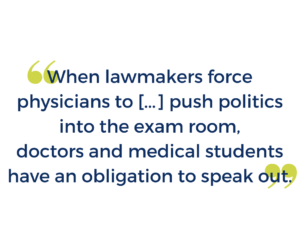 by Katie Hansen
by Katie Hansen
MS1 at Dell Medical School at the University of Texas at Austin
The 2017 legislative session in Texas has been a disheartening one for women and the pro-choice movement. State lawmakers have already proposed 17 bills that would make it more difficult for women to access abortion. On February 15th, I testified at the Health and Human Services senate committee hearing at the Texas state Capitol regarding three bills aimed at restricting abortion access in the state: SB 258 would force a woman seeking an abortion to fill out an intrusive form regarding the burial or cremation of fetal tissue; SB 8 bans the donation of fetal tissue from abortion clinics for research and contains a copy of a federal ban on “partial birth abortions”; and SB 415 prohibits dilation and evacuation, the safest and most common abortion procedure performed during the second trimester and criminalizes physicians who perform it. In the past, I have spoken out against such inappropriate regulations, but since starting medical school I have felt the need to speak louder. This was my first time testifying at the Capitol, and it was a challenging learning experience.
The legislative process seems intentionally confusing, as if it were designed to discourage public participation. One must arrive at the Capitol early in the morning to register to testify and be prepared to spend an entire day waiting to speak. Public testimony is limited to two minutes, an impossibly short amount of time when tasked with addressing the harmful provisions of three anti-choice bills.
 After registering to testify, I made my way to the senate chamber to find the nine committee members – six of whom are strongly anti-choice – sitting at a long formal table on the senate floor. Before hearing public testimony, the committee first heard from those invited to testify in support of the bills. A parade of anti-science “experts” testified, and for the next several hours I sat in horror as lawyers and “pro-life” medical doctors praised the bills for their efforts to protect the unborn and improve public health and safety. By the time the committee finally called for public testimony, I was anxious. My concerns grew when, moments before I was called to speak, a Republican senator smashed the glass tabletop with his gavel in an attempt to silence NARAL Pro-Choice Texas intern Maggie Hennessy after she demanded that the committee “stop playing with women’s health care as if it’s your own political puppet.” Clearly, I would not be addressing an encouraging audience.
After registering to testify, I made my way to the senate chamber to find the nine committee members – six of whom are strongly anti-choice – sitting at a long formal table on the senate floor. Before hearing public testimony, the committee first heard from those invited to testify in support of the bills. A parade of anti-science “experts” testified, and for the next several hours I sat in horror as lawyers and “pro-life” medical doctors praised the bills for their efforts to protect the unborn and improve public health and safety. By the time the committee finally called for public testimony, I was anxious. My concerns grew when, moments before I was called to speak, a Republican senator smashed the glass tabletop with his gavel in an attempt to silence NARAL Pro-Choice Texas intern Maggie Hennessy after she demanded that the committee “stop playing with women’s health care as if it’s your own political puppet.” Clearly, I would not be addressing an encouraging audience.
In medical school we are taught to provide accurate information to our patients, to respect patient autonomy, and to practice sound medical judgment. When lawmakers force physicians to do the opposite and push politics into the exam room, doctors and medical students have an obligation to speak out. Legislators are not doctors, but these bills place the judgment of politicians above that of medical professionals to the detriment of women. I explained this to the committee, and also described how laws that mandate doctors practice medicine in ways that counter their training and expertise are detrimental to the patient-physician relationship. I asked the committee to consider the dilemma they are putting doctors in by criminalizing a common and safe medical procedure.
Requiring physicians to ignore their best medical judgment or face possible criminal charges is egregious. Our elected officials in Texas must stop politicizing reproductive health care, shaming women, and interfering in decisions that belong strictly to women and their doctors.
Attacks on women’s health are demoralizing, but for me and many others living in choice-hostile states, they also feel familiar. For the past several years, Texas politicians have been successfully implementing laws that restrict access to abortion. While Roe v. Wade (1973) established a woman’s constitutional right to abortion, Casey v. Planned Parenthood (1992) changed the game by allowing states to regulate abortion during the first trimester in order to safeguard a woman’s health and safety. Since that time, Texas has been a laboratory for the anti-choice movement, testing the legal limits of abortion regulations. Some of the state’s more distressing successes include a 24-hour waiting period, mandatory pre-procedure sonograms, outdated regulations on medication abortions, and the requirement that doctors provide medically-inaccurate information to women. In 2013, Texas implemented HB2, a law that required all abortions to be performed at ambulatory surgical centers and the doctors who perform them to have admitting privileges at a hospital within 30 miles. Fortunately, the U.S. Supreme Court struck down the law, but anti-choice lawmakers quickly took to the drawing board, working on new strategies to restrict abortion access in Texas.
The opinions of healthcare professionals matter when it comes to policy that will directly impact women’s health, and it is crucial that those who understand these issues use their expertise and authority to educate legislators and stand up for women. As a medical student, I recognize the power of my voice. When white coats speak, people listen. Regardless of what harmful new abortion restrictions might exist when the dust of this current legislative session settles, I am committed to being an advocate for my future patients and will continue to push back against anti-choice lawmakers in Texas.